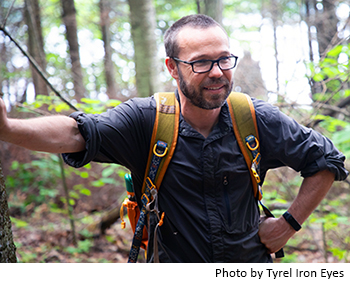John Creese collaborates with Wisconsin Anishinaabe tribe on archeological project and field school

NDSU associate professor of anthropology John Creese has been working with heritage professionals from the Red Cliff Band of Lake Superior Chippewa Nation and the University of Wisconsin-La Crosse, to survey and document ancient Indigenous village sites on tribal lands in Wisconsin. The group, working under the authority and direction of the Red Cliff Tribal Historic Preservation Office, has uncovered and catalogued hundreds of historical belongings that will be cared for by the tribe over the long term, while promoting a model of archeology that is conducted by, with, and for Indigenous peoples.
Called the Gete Anishinaabeg Izhichigewin Community Archaeology Project, Creese and Heather Walder, an archaeology lecturer from the University of Wisconsin-La Crosse have collaborated with Mr. Marvin DeFoe, Red Cliff’s Tribal Historic Preservation Officer, on the project over the past three years. The archeological survey and field school aims to uncover artifacts and settlement sites related to the rich history of the Anishinaabeg, or Ojibwe people, within what is today the Red Cliff Reservation. Funded in part by Wisconsin Humanities, the project is one of only 13 award recipients nationwide to receive a Tribal Heritage Grant from the Department of Interior National Park Service.
The project connects community members and students with culture through hands-on opportunities to share and learn at the excavation.
“I feel hugely fortunate and privileged to be a part of this project. Red Cliff is leading the way in putting archaeological research to work to advance the Nation’s interests through research, education programming, and heritage management; fundamentally, it’s about using the tools of archaeology to support Indigenous self-determination, and they’re doing that.”
Creese was among a group of individuals recently featured on the podcast Human Powered discussing the Gete Anishinaabeg Izhichigewin project. Hosted by journalist and storyteller Jimmy Gutierrez, Human Powered shares stories about people in communities across Wisconsin. Codirectors Marvin DeFoe and Heather Walder, along with Tribal Historic Preservation Office staff member Edwina Buffalo-Reyes were featured on the podcast.
The podcast also noted the project’s connection to Wisconsin’s Act 31. Passed in 1989, the state law requires all students in the state learn about the history, culture, and tribal sovereignty of Wisconsin's federally recognized tribes.
“The Human Powered podcast was a great opportunity to highlight the role of Indigenous knowledge in doing meaningful collaborative research. Red Cliff doesn’t need academics like me to teach them about their history or culture - it’s something they live already every single day. However, by working together and sharing our different knowledge and expertise, there’s a synergy. We’re building something greater than the sum of its parts, and it’s enriching for everyone involved.”
Listen to the Human Powered Podcast: https://wisconsinhumanities.org/podcast/


